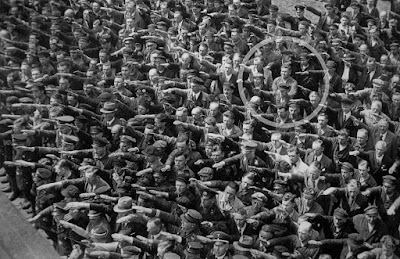Many people reject this and argue that, regardless of the nature of a culture, there are certain universal moral truths. All life is sacred, for example, or all people should be treated as equals; eating other human beings or committing incest is sinful and must be condemned, no matter what was considered 'normal' in the civilizations being discussed.
 These are important factors to discuss when making judgments about citizens of totalitarian regimes. We all like to think of ourselves as decent 'good' people that would never have supported a man like Hitler or belonged to a regime such as Nazi Germany's. We would never have voted for the National Socialists; never have joined the party; never have turned in a friend or neighbor or family member for opposing the party; never have believed that Jews or Gypsies were subhuman and supported their extermination; never have supported eugenics and had your child euthanized due to genetic conditions; never have supported a continent-wide war in order to spread the dominance of your nation.
These are important factors to discuss when making judgments about citizens of totalitarian regimes. We all like to think of ourselves as decent 'good' people that would never have supported a man like Hitler or belonged to a regime such as Nazi Germany's. We would never have voted for the National Socialists; never have joined the party; never have turned in a friend or neighbor or family member for opposing the party; never have believed that Jews or Gypsies were subhuman and supported their extermination; never have supported eugenics and had your child euthanized due to genetic conditions; never have supported a continent-wide war in order to spread the dominance of your nation.But how accurate is that self-portrait? Germans were considered a very cultured people prior to World War II. They produced composers like Bach, Beethoven and Mozart. Great scientists, sculptors, philosophers, authors and painters abounded like nowhere else. So how could they possibly have allowed themselves to support a crude, violent and bigoted man such as Hitler? And, even more difficult to understand, how could they have actively worked to participate in his policies such as genocidal anti-Semitism, euthanasia or book-burning?

Think about what was going on in Germany at the time. Could that have played a role? Look at who supported Hitler and why in your notes and handouts. For more information, check out this article. Where would you have been in the list and what might you have thought? Try to put yourself back in that time.
 Would you have been one of the few that stood up to Hitler and the Nazis? The picture above is of August Landmesser, a German shipyard worker who stood up against the regime and paid the price for it. Go here in order to learn his story. Another dissenter who died for her views was Sophie Scholl (right). Go here to find out about her defiance to the tyranny of the Nazis.
Would you have been one of the few that stood up to Hitler and the Nazis? The picture above is of August Landmesser, a German shipyard worker who stood up against the regime and paid the price for it. Go here in order to learn his story. Another dissenter who died for her views was Sophie Scholl (right). Go here to find out about her defiance to the tyranny of the Nazis.Consider what you know about the Nazi regime and how it gained power. In the comments section below, please answer the following questions: If you lived in Germany during the 1930s, would you have supported the Nazis? If the answer is yes, would you have been active in that support (being a part of the party, been anti-Semitic, an informer for the Gestapo etc.)? If the answer is no, would you have actively attempted to resist the regime as Landmesser or Scholl did? Or would you have remained silent? Remember that this is not a comment on who you are today.